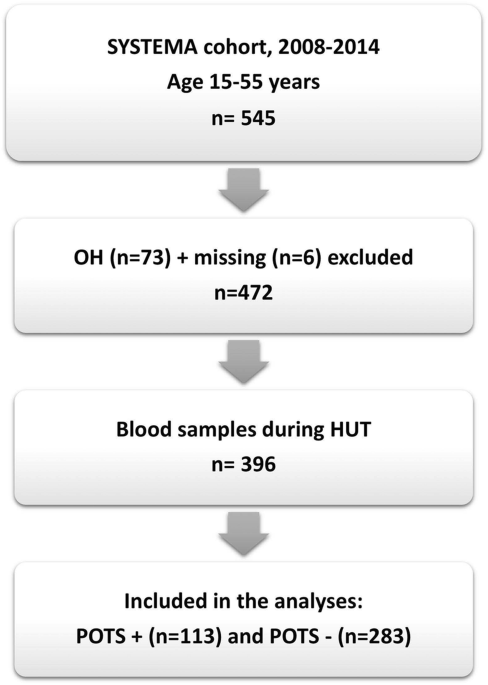Proteomic analysis reveals sex-specific biomarker signature in

Background Postural orthostatic tachycardia syndrome (POTS) is a variant of cardiovascular (CV) autonomic disorder of unknown etiology characterized by an excessive heart rate increase on standing and orthostatic intolerance. In this study we sought to identify novel CV biomarkers potentially implicated in POTS pathophysiology. Methods We conducted a nested case-control study within the Syncope Study of Unselected Population in Malmö (SYSTEMA) cohort including 396 patients (age range, 15–50 years) with either POTS (n = 113) or normal hemodynamic response during passive head-up-tilt test (n = 283). We used a targeted approach to explore changes in cardiovascular proteomics associated with POTS through a sequential two-stage process including supervised principal component analysis and univariate ANOVA with Bonferroni correction. Results POTS patients were younger (26 vs. 31 years; p < 0.001) and had lower BMI than controls. The discovery algorithm identified growth hormone (GH) and myoglobin (MB) as the most specific biomarker fingerprint for POTS. Plasma level of GH was higher (9.37 vs 8.37 of normalised protein expression units (NPX); p = 0.002), whereas MB was lower (4.86 vs 5.14 NPX; p = 0.002) in POTS compared with controls. In multivariate regression analysis, adjusted for age and BMI, and stratified by sex, lower MB level in men and higher GH level in women remained independently associated with POTS. Conclusions Cardiovascular proteomics analysis revealed sex-specific biomarker signature in POTS featured by higher plasma level of GH in women and lower plasma level of MB in men. These findings point to sex-specific immune-neuroendocrine dysregulation and deconditioning as potentially key pathophysiological traits underlying POTS.

Exploring Temporal and Sex-Linked Dysregulation in Alzheimer's

Improvement of Discrimination (C-Statistics) of 10-Year Risk Estimates

Topographic mapping of the glioblastoma proteome reveals a triple

Study protocol for head-up tilt test (HUT)., o que é tilt test

PDF) Predicting Therapeutic Efficacy of Pharmacological Treatments in Children with Postural Orthostatic Tachycardia Syndrome: A Mini-Review

Plasma proteomic biomarker signature of age predicts health and

High-throughput proteomics profiling-derived signature associated

Proteomic Profiling of Paired Interstitial Fluids Reveals

Baroreflex control of muscle sympathetic nerve activity in postural orthostatic tachycardia syndrome

Integrated proteomics reveals brain-based cerebrospinal fluid